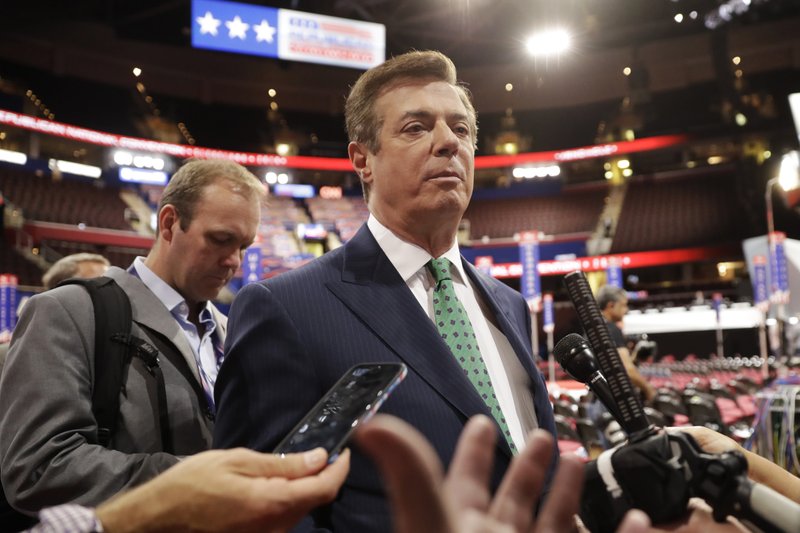WASHINGTON — President Donald Trump's former campaign chairman, Paul Manafort, secretly worked for a Russian billionaire to advance the interests of Russian President Vladimir Putin a decade ago and proposed an ambitious political strategy to undermine anti-Russian opposition across former Soviet republics, The Associated Press has learned. The work appears to contradict assertions by the Trump administration and Manafort himself that he never worked for Russian interests.
Manafort proposed in a confidential strategy plan as early as June 2005 that he would influence politics, business dealings and news coverage inside the United States, Europe and the former Soviet republics to benefit the Putin government, even as U.S.-Russia relations under Republican President George W. Bush grew worse.
Manafort pitched the plans to Russian aluminum magnate Oleg Deripaska, a close Putin ally with whom Manafort eventually signed a $10 million annual contract beginning in 2006, according to interviews with several people familiar with payments to Manafort and business records obtained by the AP. Manafort and Deripaska maintained a business relationship until at least 2009, according to one person familiar with the work.
"We are now of the belief that this model can greatly benefit the Putin Government if employed at the correct levels with the appropriate commitment to success," Manafort wrote in the 2005 memo to Deripaska. The effort, Manafort wrote, "will be offering a great service that can re-focus, both internally and externally, the policies of the Putin government."
Manafort's plans were laid out in documents obtained by the AP that included strategy memoranda and records showing international wire transfers for millions of dollars. How much work Manafort performed under the contract was unclear.
The disclosure comes as Trump campaign advisers are the subject of an FBI probe and two congressional investigations. Investigators are reviewing whether the Trump campaign and its associates coordinated with Moscow to meddle in the 2016 campaign. Manafort has dismissed the investigations as politically motivated and misguided. The documents obtained by AP show Manafort's ties to Russia were closer than previously revealed.
In a statement to the AP, Manafort confirmed that he worked for Deripaska in various countries but said the work was being unfairly cast as "inappropriate or nefarious" as part of a "smear campaign."
"I worked with Oleg Deripaska almost a decade ago representing him on business and personal matters in countries where he had investments," Manafort said. "My work for Mr. Deripaska did not involve representing Russia's political interests."
Sen. Lindsey Graham, R-S.C., one of Trump's critics in the Senate, called the disclosures about payments to Manafort from the Russian billionaire "very disturbing if true."
"That's basically taking money to stop the spread of democracy, and that would be very disturbing to me," he said Wednesday on Capitol Hill.
Democrats on the House intelligence committee said the new revelations will feature in the congressional investigations. Rep. Eric Swalwell, D-Calif., said on MSNBC on Wednesday that Manafort should appear before the committee, and he raised the specter of a subpoena should Manafort not appear on his own.
Another member of the intelligence committee, Rep. Jackie Speier, D-Calif., said the disclosure "undermines the groundless assertions that the administration has been making that there are no ties between President Trump and Russia. This is not a drip, drip, drip" situation, she said. "This is now dam-breaking with water flushing out with all kinds of entanglements."
Deripaska became one of Russia's wealthiest men under Putin, buying assets abroad in ways widely perceived to benefit the Kremlin's interests. U.S. diplomatic cables from 2006 described Deripaska as "among the 2-3 oligarchs Putin turns to on a regular basis" and "a more-or-less permanent fixture on Putin's trips abroad." In response to questions about Manafort's consulting firm, a spokesman for Deripaska in 2008 — at least three years after they began working together — said Deripaska had never hired the firm. Another Deripaska spokesman in Moscow last week declined to answer AP's questions.
When asked Wednesday about Manafort's work for Deripaska, White House spokeswoman Sarah Huckabee Sanders said, "We do not feel it's appropriate to comment on someone who is not an employee at the White House," although Press Secretary Sean Spicer discussed Manafort earlier this week during a televised news briefing.
Read Thursday's Arkansas Democrat-Gazette for full details.
